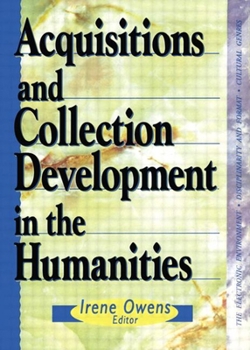Acquisitions and Collection Development in the Humanities
(Part of the Acquisitions Librarian Series)
Acquisitions and Collection Development in the Humanities is a one-of-a-kind guide on the procedures, approaches, and principles needed to make sound decisions in acquiring materials in various areas of the humanities. It gives you an inside look at managerial concerns in documentary delivery, changing budgetary needs, and fluctuations in journal prices and helps you address many of the important questions in acquisitions and collection development within both traditional and technological environments.As contributing author Dennis Dillon puts it, the ultimate goal of humanities librarians "is not to acquire information bytes and bits, but to promote integrity: integrity of texts, integrity of selection, the integrity of the collection, and the integrity of the library and its ultimate purpose." This objective underlies this multifaceted and comprehensive collection of articles, as the authors address many interesting issues, developments, and challenges in the field, including:
selecting candidates for digitization and producing e-texts collecting in areas that don't have immediate utility or that may be unpopular what librarians need to know about the humanities as a discipline in order to effectively meet the informational and technological needs of their constituencies online discussion groups as useful sources of webliographic information cooperative collection building the importance of maintaining a high degree of local ownership for materials the principles, criteria, and tools needed to develop a Native American studies collection document-driven and use-driven approaches to collecting acquiring and preserving records that chronicle the role played by African Americans in the United States'developmentAcquisitions and Collection Development in the Humanities can help professional librarians, graduate school faculty, and students in information and library science acquire the knowledge and skills necessary for building a broadly based and academically responsive collection. It will certainly help you keep up with changes in the information environment and show you how the tools you've developed for selecting traditional library materials will be useful as you grapple with electronic texts, "spider" search mechanisms on the Web, becoming a webliographer, and budget shortfalls.




